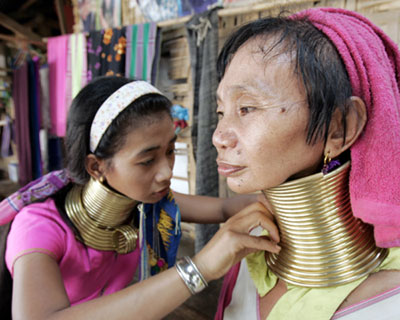Asia-Pacific
Long-neck refugees get Thai "human zoo" treatment
(Reuters)
Updated: 2006-09-18 16:51
 |
Large Medium Small |
MAE HONG SON, Thailand - For the past two decades, hundreds of ethnic Padaung "long-neck" people from military-ruled Myanmar have enjoyed relative peace and security as refugees in the hills of northern Thailand.
 Ma-Pang (L), a 22-year-old Karen hill tribe woman, cleans the ring around the neck of her mother Ma-Nang at a village near Mae Hong Son province, north of Bangkok in this picture taken September 7, 2006. For the past two decades, hundreds of ethnic Padaung "long-neck" people from military-ruled Myanmar have enjoyed relative peace and security as refugees in the hills of northern Thailand. But plans to consolidate three Padaung villages into a single refugee settlement are intensifying concerns among human rights workers about their exploitation as a tourist attraction. Picture taken September 7, 2006. [Reuters] |
But plans to consolidate three Padaung villages into a single refugee settlement are intensifying concerns among human rights workers about their exploitation as a tourist attraction.
Already, busloads of foreigners on "eco-tourism" trips pile into the remote villages every day to pose beside the Padaung "giraffe women", so-called for their elongated necks propped up on layers of brass coils.
Some visitors -- and some Padaung -- say the tours are more akin to trips to a human zoo.
"I'm happy when lots of tourists come here and I have a good time with them, but when I think harder about it, they are coming because we are strange and that gives me mixed feelings," said 21-year-old Ma Ri, who fled the former Burma 10 years ago.
Unfortunately, say refugee rights campaigners, Thailand's exploitation of its hill-tribe communities is as old as the hills themselves.
"Thai people, I'm sorry to say, are insensitive to their minorities, and the hill-tribe minorities have always been a money attraction," Senator Kraisak Choonhavan told Reuters.
"If you look at advertisments for the north, you find countless pictures of all these colourful peoples and yet there has been no progress" in integrating them into Thai society, he said.
As well as citing security concerns, government officials in Mae Hong Son province, 920 km (570 miles) north of Bangkok, say the new settlement is vital to preserving ancient Padaung culture.
However, they also concede that ancient culture means tourist dollars.
"We will encourage each group to brainstorm how they could conserve their traditions to attract tourists to come, see and feel it for real," provincial governor Direk Ghonkleeb told Reuters.
Although all the other camps housing the 140,000 Myanmar refugees in Thailand are closed to outsiders, tourists pay between 250 and 500 baht ($13.30) each to enter Padaung villages.
However, the women themselves, who are officially barred from leaving the villages, receive only a fraction of that -- often as little as 1,500 baht a month -- and have to supplement their income selling trinkets and postcards.